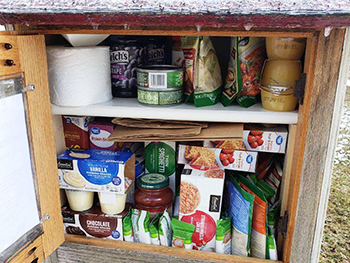Bearing fruit in a time of need
In his book The Rise of Christianity, Dr. Rodney Stark estimates that Christianity grew an average of 40 percent per decade for the first few centuries of its existence. To put that in perspective, if WELS grew at that rate, in two generations we would have over two million members.
How did that happen? Christianity was started by misfits from the armpit of the Roman Empire. Christianity didn’t worship in opulent temples. Early believers worshiped in homes. Christianity had no sociological advantages. Becoming a Christian made it likely you would experience ridicule or even persecution. How does Christianity explode in those circumstances?
The gospel. The gospel was entirely unique. There were plenty of religions that talked about powerful gods who demanded you offer sacrifices to them. The gospel told of an all-powerful God who became weak and sacrificed himself for you. Other religions offered some version of life after death, but it was always conditional. Do good work; get a good eternity. You faced death with fingers crossed, hoping for the best. The gospel offered physical resurrection and eternity in paradise entirely on the basis of Christ’s work, not your own. His death and his resurrection meant you had assurance now. You faced death confidently, knowing you were going to an infinitely better place.
 St. Paul wrote to the Colossians, “The gospel is bearing fruit and growing throughout the whole world” (1:6). The supernatural power and beauty of the gospel—that is what caused the early church to explode.
St. Paul wrote to the Colossians, “The gospel is bearing fruit and growing throughout the whole world” (1:6). The supernatural power and beauty of the gospel—that is what caused the early church to explode.
However, that doesn’t tell the whole story. It wasn’t simply that the early Christians proclaimed the gospel. By the way they lived their lives, they gained an audience for the gospel. A good example of this occurred during a pandemic.
In the early fourth century, the historian Eusebius wrote about a plague that was rolling over the eastern half of the Empire. Healthy people would flee the cities for the safety of the countryside. But one group largely stayed behind—Christians. “All day long, [Christians] tended to the dying and to their burial, countless numbers with no one to care for them.” Eusebius states that as people witnessed this compassion, “[the Christians’] deeds were on everyone’s lips, and they glorified the God of the Christians.” There are dozens of examples of history noting how Christians took care of the sick. It didn’t matter if the sick person was a Christian or pagan.
Christians were known to care for the poor too. The Roman Emperor Julian wanted to wipe out Christianity and re-institute emperor worship. After a few years of trying, Julian wrote a letter to a pagan priest in which he explained why he now believed Christianity would take over the empire. “[Christians] support not only their poor, but ours as well. All men see that our people lack aid from us.” Christians showed levels of mercy and benevolence that won them an audience. When people would ask Christians, “Why do you do what you do?” they could share the gospel.
COVID-19 is undeniably awful. Many thousands are going to die. The economies of the world are in shambles. It is bad. However, COVID-19 is also an amazing opportunity. It is, first and foremost, an opportunity to serve Christ by serving our fellow man in whatever way they need.
- Maybe you contact all the at-risk residents on your block—the elderly, those with compromised immune systems, etc.—and offer to make all their grocery store runs for them. (You can leave the bags on the porch, ring the bell, then step back ten feet to make sure they get them.)
- If you live near a single-parent hospital worker or first responder, maybe you offer to watch their child when they need to work.
- Maybe you pick up your dinner a couple nights a week from the mom-and-pop restaurant that could easily go out of business in the lockdown.
- Is there a single person you know who is shuttered up, perhaps a widow or widower? Maybe you set aside 20 minutes a day to talk to them on the phone or FaceTime. Have your kids do the same. Help them deal with the crushing loneliness.
- If the federal government ends up giving funds to citizens and you don’t really need it to survive, maybe you give yours away to others who are hit harder by the economic downturn than your family.
- Do you own a business? When this is over, hire all you can. Don’t consider the bottom line. If you can hire, hire.
As we seize those God-given opportunities to serve our neighbor, perhaps Christ will give us another opportunity—to share why we do what we do . . . to share the hope we have.
You probably know that American Christianity is falling apart. People have been leaving the church in droves over the last three decades, especially younger generations. There have been multiple studies about why this is happening. One of the biggest reasons is many people think Christianity is irrelevant. COVID-19 is an opportunity to prove that is the furthest thing from the truth! If Americans are caught in a nexus of needs and fears, fine.
Let us be the ones who step up first to meet those needs.
Let us be the ones to explain why we need not fear anything.
Let us do all this, not because we want to grow by 40 percent. Let us do this simply because we are the body of Christ. We do what he would do. And we want him glorified. “They glorified the God of the Christians.”
In these challenging days ahead, may the Spirit strengthen your faith with his unbreakable promises. May Christ give you health and compassion.
Submitted by Rev. Jon Hein, director of WELS Commission on Congregational Counseling







